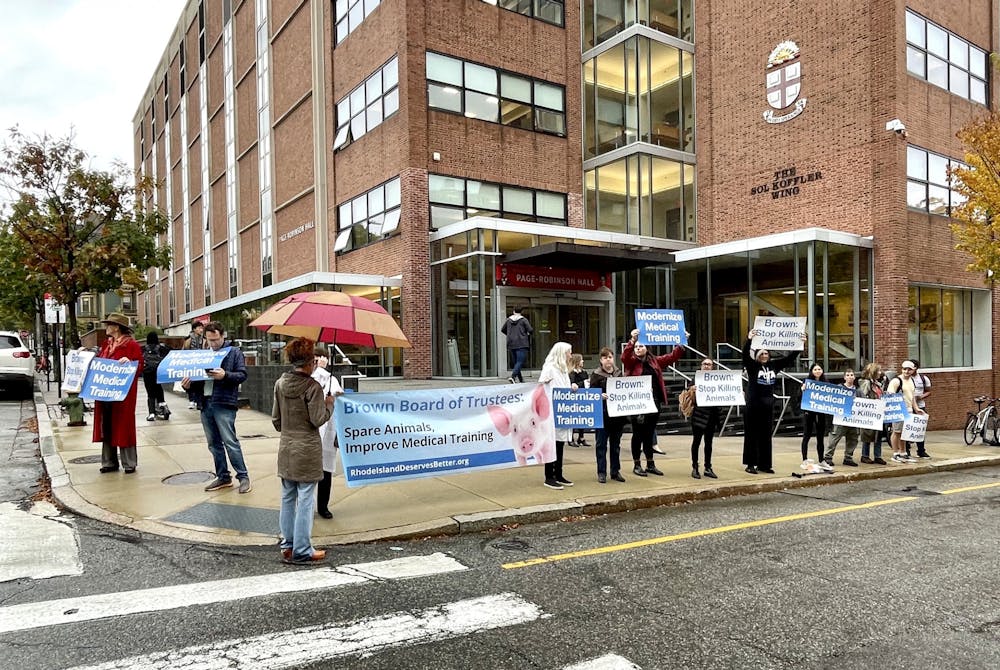This Thursday, around 15 people stood outside Page-Robinson Hall, holding signs that read “Modernize Medical Training” and “Brown: Stop Killing Animals.” The Physicians Committee for Responsible Medicine, a nonprofit health organization with more than 17,000 doctor members, organized the demonstration to protest the use of live pigs for training in the joint Brown University and Rhode Island Hospital emergency medicine residency program.
“The reason we’re here right now is because the Board of Trustees of the University is meeting here today,” said Kerry Foley, a PCRM member and retired emergency medicine physician. “The Emergency Medicine Residency Program here at Brown is one of the few in the country that still continues to use live animals to train their residents for what are called surgical airways.” A surgical airway allows a patient to breathe in cases of foreign bodies or extreme facial trauma.
According to a survey by PCRM, Brown is among the 2.8% of emergency medicine programs in the U.S. and Canada that use live animals in their training.
The demonstration was in conjunction with a letter sent to President Christina Paxson P’19 and the Board of Trustees, as well as a student petition organized by members of the Brown Animal Rights Coalition. The petition has accumulated roughly 540 signatures from Brown community members, according to Benny Smith ’23, a Brown Animal Rights Coalition student leader.
“This is the only program in New England that continues to use live animals, so we just don’t think it’s defensible,” Foley said.
“It’s very soul-sucking for student doctors to be in a situation where they are involved in the death of a living creature for their training benefit,” said Marge Peppercorn, a PCRM member and pediatric physician.
According to Foley, PCRM is focused on modernizing medical training. “There are now simulators that are human-identical that can be used repeatedly,” Foley said. “If you’re doing this on a pig, you get one shot. If you’re doing this on a mannequin, you can do it (multiple times) until you are proficient.”
“A pig that’s anesthetized on a stretcher is nothing like a person that is rushed into emergency rooms, so we feel strongly that it’s not as good training,” Peppercorn added. “It would not really be an added cost to Brown, since they already have the simulators … The only (technique) they’re training on the pigs is the (surgical airway procedure).”
University spokesperson Brian Clark wrote in an email to The Herald that “Brown EM trains resident physicians using synthetic models and high-fidelity mannequins for a variety of procedures. Yet, equally effective synthetic model alternatives simply do not exist for every complex medical procedure that an emergency physician must be prepared to perform.”
In a joint statement to The Herald, the University and RIH wrote that they are “committed to the highest standards in the responsible use of animals in the limited instances they are used for training medical professionals.”
“The training is overseen by physicians and a veterinarian, and is conducted in full compliance with all pertinent laws and regulations,” the University and RIH wrote in their joint statement. “The hospital has completed rigorous accreditation by the American Association for Accreditation of Laboratory Animal Care” International.
“This training provides the skills to perform an essential technique for establishing a patient airway during life-threatening situations for both adult and pediatric patients, such as severe facial trauma,” the statement continued.
Clark added that “fewer than 15 pigs are included in the protocol for this annual training.”
After PCRM initially filed a complaint in 2019 against the Warren Alpert Medical School, Rhode Island State Sen. Bridget Valverde and Representative Joseph J. Solomon Jr. sponsored a bill to limit the use of live animals for medical training in the state. Foley said that she testified twice at the State House in support of this legislation.
Progress on the bill has since stalled, but “we’re hopeful that this will reinvigorate interest in it,” Foley said.
“We should try to minimize harm as much as possible,” said BARC student leader Hari Dandapani ’23. The use of live animals in medical training “is a pretty clear cut case of a way we can minimize harm.”
Ashley Guo is an arts & culture writer and layout designer. She previously covered city and state politics as a Metro section editor. In her free time, Ashley enjoys listening to music, swimming, and reading!





